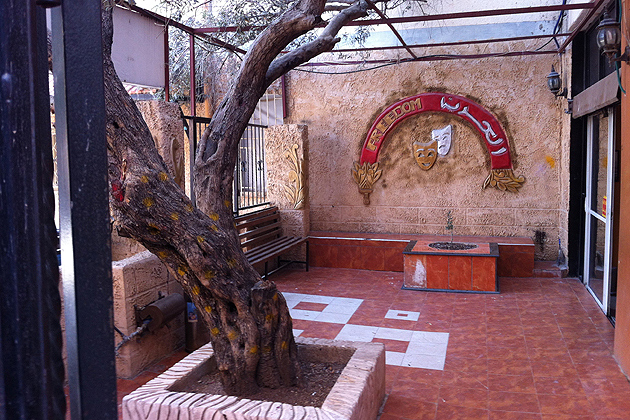
From the time of Ancient Greece to the modern world, it has been debated whether life imitates art or art imitates life.
Often the debate has been acted out on stage, something that Gary English, Board of Trustees Distinguished Professor of Dramatic Arts in the School of Fine Arts, has explored throughout his career, which includes serving as artistic director of the Connecticut Repertory Theatre at UConn.
For the past two years, English has been studying how issues in the Middle East are reflected in dramatic productions while developing a book with the working title: “Theatre and Human Rights: The Israeli-Palestinian Conflict.” In the course of his research, he has served as a consultant to the Freedom Theatre, a theater and cultural center located in the Jenin Refugee Camp in Occupied Palestine in the northern part of the West Bank.

The Freedom Theatre was founded as a center for arts therapy including drama therapy and art therapy for children who lived under the stressful conditions of a refugee camp. English says the arts provide a way for these children to work through their emotional trauma and find alternative and productive outlets for their creative energy and identity.
“A significant amount of theater in the West Bank is about Palestinians dealing with Palestinian life and the social problems they confront,” says English. “Palestinian society is a collective society, so theater is a perfect way for a collective society to think about the problems there and how to cope with them. Some of those problems relate to the political situation and the conflict and some don’t.”
The Freedom Theatre was founded by Juliano Mer-Khamis, an Israeli actor, director, and political activist of both Jewish and Palestinian heritage, who was killed in April 2011. English knew Mer-Khamis and other leaders of the Freedom Theatre through his work as a consultant, and earlier this year he was asked to serve as artistic manager of the theater for the next 12 months, during a sabbatical from UConn.
English says his role will be to develop “the artistic infrastructure” of the Freedom Theatre, planning the production calendar and budget, and managing other administrative duties to support the creative activities of the theater, working with the directors of the acting program, Nabeel Al-Raee and Micaela Miranda.
“The three of us will function as an artistic directorate,” he says. “I will create the artistic infrastructure of the theater. We need to balance the various programs, including a new youth theater grant from the Swedish government to go into public schools to help teachers use drama in the curriculum.”
The productions staged by the Freedom Theatre take a similar approach to the one used by English during his many years guiding the Connecticut Repertory Theatre, which has drawn prominent actors and directors from the New York stage to Storrs. During English’s tenure at CRT, productions included “The Exonerated,” which examines the capital punishment system; “Pentecost,” about political refugees after the fall of the Iron Curtain; and an adaptation of “Trojan Women” following the Sept. 11 attacks.

One of the first productions at the Freedom Theatre he saw during his research and consulting was an adaptation of George Orwell’s “Animal Farm.”
“It was really interesting to me because one would think in the West Bank a theater would do a piece of political drama to address the Israeli occupation,” English said. “But in this case the main target was the Palestinian Authority. The piece was critiquing their own government. I had a deep interest in political drama, so when I saw that production of ‘Animal Farm,’ I thought studying theater and politics in Palestine and Israel makes a lot of sense because it’s like going to the pure test tube because everything in Israel and Palestine is political.”
English began his research through a faculty development grant targeted for work abroad, and subsequently also received a grant from the University’s Human Rights Institute. One of the initial results of the research was a course for UConn students titled “Theater, Public Discourse, and Human Rights.”
“My main interest is how dramaturgy manifests itself through politics or politics manifests itself through dramaturgy,” English says. “What are the ways in which the Palestinians manifest political or ideology through character, dialogue, or abstract means like music? It’s also a very lyrical drama. Palestinian theater is very rich in the Arabic tradition of poetry, the storyteller. All of these theaters are deeply connected to their community roots.”
English says the history of theater demonstrates that the stage is a place where serious issues of the day can be discussed and examined.
“We think of theater as a means by which we take on big social and political ideas and fight it out on the stage, which is exactly what the Greeks did in ancient Athens – taking the social and political problems of the day and letting them compete for space in the public sphere,” he says. “The great thing about theater is that is doesn’t deal with the trivial or the banal. Drama, by its very nature, unlike television or even film, tends to deal very well with nuance and subtlety, pulling apart these problems in complicated and detailed ways.
“The history of drama from George Bernard Shaw, even Shakespeare, and everything in between, is attuned to the idea that human beings are complex organisms, not all good and not all bad, and that every situation brings out the best and worst in human nature. Drama is able to look at the situation with a great deal more subtlety and fine relief than the traditional rhetoric of political discourse. I’m convinced that drama and the arts is a pretty good way to look at the conflict. If we look at the conflict in cultural terms, rather than purely political terms, we might find a deeper understanding of what’s going on.”


